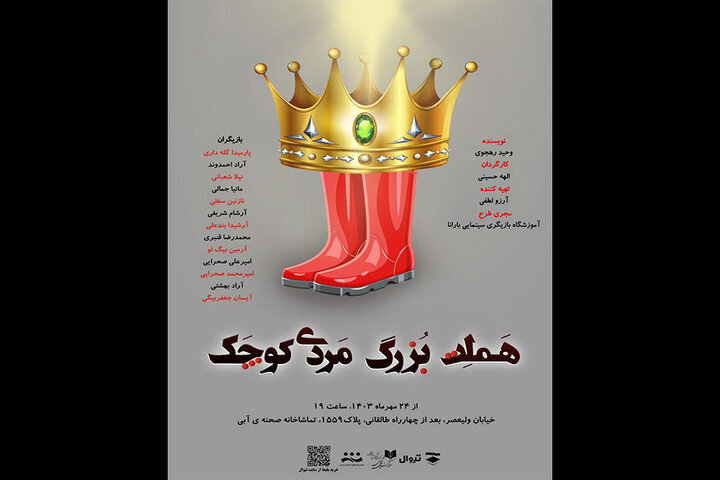Children’s adaptation of “Hamlet” goes on stage

TEHRAN- A loose adaptation of English playwright and poet William Shakespeare’s most popular play “Hamlet” is currently on stage at Sahne-ye Abi Cultural and Artistic Center in Tehran.
Director Elaheh Hosseini has renamed the play “Hamlet, the Little Big Man” to perform it for children.
Parmida Galedari, Arad Ahmadvand, Nila Shabani, Mania Jamali, and Aisan Jafarbeigi are the main members of the cast for the play, which will remain on stage until October 20.
"Hamlet" is a tragedy that follows the story of Prince Hamlet of Denmark as he seeks revenge for the murder of his father, King Hamlet. The play begins with the ghost of King Hamlet appearing to his son and revealing that he was murdered by his own brother, King Claudius, who has since married Queen Gertrude and taken the throne. Hamlet is torn between his desire for revenge and his inner turmoil, struggling with his own mortality and the consequences of his actions.
As Hamlet plots his revenge, he becomes increasingly isolated and paranoid, leading to a series of tragic events. He puts on a play reenacting his father's murder in an attempt to confirm Claudius's guilt, which ultimately leads to the exposure of his own madness. Hamlet's relationships with those around him, including his love interest Ophelia and his friends Rosencrantz and Guildenstern, become strained as he becomes more consumed by his quest for vengeance.
As the play progresses, the tension between Hamlet and Claudius reaches its peak, leading to a dramatic confrontation that results in several deaths. Hamlet ultimately fulfills his quest for revenge but at a great cost, as he too succumbs to his wounds. The play ends with the deaths of Hamlet, Claudius, Gertrude, and Laertes, highlighting the destructive nature of revenge and the tragic consequences of acting on impulse.
Through complex characters and poetic language, Shakespeare explores themes of revenge, madness, and mortality in "Hamlet." The play delves into the inner workings of the human psyche, portraying the struggles of a young prince caught in a web of deceit and treachery. Ultimately, "Hamlet" serves as a cautionary tale about the dangers of succumbing to one's darkest impulses and the tragic outcome of seeking vengeance at any cost.
"Hamlet" has been adapted into various forms of media, including film, television, and stage productions. One notable adaptation is Kenneth Branagh's 1996 film version of "Hamlet," which remains faithful to the original text and features an ensemble cast of acclaimed actors. Branagh's adaptation captures the essence of Shakespeare's tragic tale while incorporating cinematic techniques to enhance the narrative, making it accessible to a wider audience.
In addition to traditional adaptations, "Hamlet" has also been reimagined in modern settings and contexts, offering new interpretations of the classic play. Examples include films like "The Lion King," which draws inspiration from "Hamlet" with its story of a young prince seeking revenge for his father's death, and stage productions that place the characters in contemporary settings to explore relevant social and political themes.
William Shakespeare, widely regarded as the greatest playwright in English literature, was born in 1564. Throughout his career, Shakespeare wrote an impressive body of work that includes over 36 plays, 154 sonnets, and several poems. His plays span across various genres, including tragedies like "Hamlet" and "Macbeth," comedies such as "A Midsummer Night's Dream" and "Twelfth Night," and histories like "Henry V" and "Richard III." Shakespeare's works are renowned for their intricate plots, memorable characters, and profound insights into the human condition, making them timeless pieces of literature that continue to captivate audiences worldwide.
SAB/
Leave a Comment